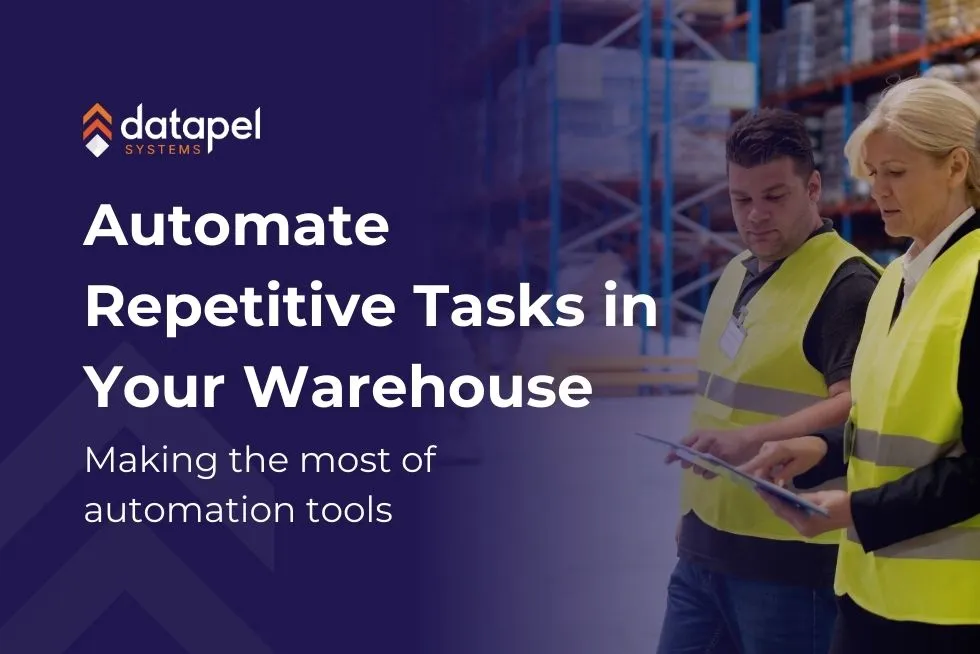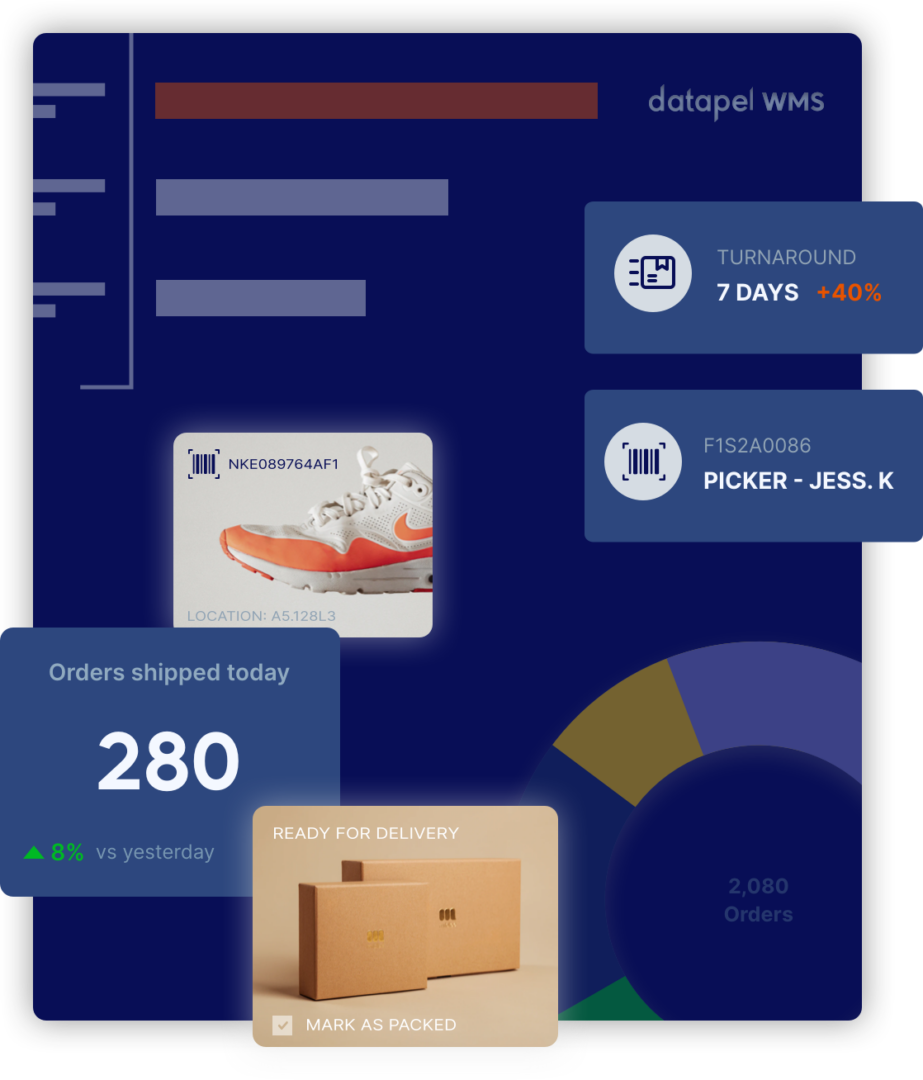Automation in Datapel for Repetitive Warehouse Tasks
Contents
If you’re managing your warehouse with Datapel Cloud.WMS, you already know how much time goes into handling orders, tracking stock, and preparing shipments. But are you making the most of the automation tools built into your system?
Many users still handle repetitive tasks manually without realising they can be automated with a few simple changes. This guide walks you through practical ways to set up automation in Datapel so you can save time, reduce errors, and keep your warehouse running smoothly.
Spot the Tasks Slowing You Down
Before you start automating, take a step back and review your current workflows. Ask yourself:
- Are staff still entering sales orders manually?
- Do you create shipping labels one by one?
- Are you updating stock counts and reordering by hand?
- How often do you double-check data across systems?
These tasks may seem small on their own, but they add up fast. Automating them in Datapel can recover hours each week and reduce the risk of human error.
Automating Repetitive Tasks in Your Warehouse Using Datapel
Datapel WMS gives you multiple ways to simplify repetitive tasks. Here are five high-impact areas to focus on first:
1. Automate Sales Order Imports
If you’re still entering ecommerce or EDI orders manually, you’re losing time and increasing the chance of mistakes.
With Datapel, you can:
- Connect Shopify, WooCommerce, MYOB, or Xero directly.
- Set up automation rules so new orders flow into your WMS automatically.
- Remove manual data entry entirely.
Quick win: This frees up your team to focus on picking and packing instead of retyping orders.
2. Use Barcode Scanning for Putaway and Picking
Barcode scanning isn’t just about speed — it’s about accuracy. If you’re still relying on paper-based processes, you’re increasing the risk of mismatched SKUs and picking delays.
In Datapel, you can:
- Enable barcode scanning for incoming goods and outbound picking.
- Train your team on scanning workflows so products are tracked automatically.
- Reduce order errors and speed up fulfilment times.
Tip: Start with your fastest-moving products to see instant results.
3. Set Up Automated Reordering
Running out of stock costs sales. Overstocking ties up cash. Neither is good for business.
Datapel helps you stay on top of inventory with automated replenishment triggers. You can:
- Define minimum and maximum stock levels per product.
- Let Datapel alert you when stock hits those thresholds.
- Create replenishment orders directly from the alert.
Benefit: You’ll spend less time monitoring stock levels and more time fulfilling orders.
4. Automate Shipping Documentation
Manually generating consignment notes, labels, and invoices slows your team down.
Inside Datapel, you can:
- Link documents directly to your sales orders.
- Set rules so labels and invoices are generated automatically.
- Send documents to your carriers or customers without manual input.
Result: Faster dispatch and fewer delays.
5. Schedule Cycle Counts and Stock Adjustments
Regular stock checks are essential, but they don’t need to interrupt your day.
Datapel lets you:
- Schedule recurring cycle counts in advance.
- Automate discrepancy reconciliation where rules are clear.
- Keep your stock data accurate without halting operations.
Pro tip: Start small — schedule weekly counts for a few key SKUs, then expand.
Use Datapel Features You Already Have
You don’t need new tools to automate your workflows. Datapel has powerful features built in — many users just haven’t set them up yet.
Workflow Automation Rules
Create event-driven triggers to handle routine tasks automatically. For example:
- When an order is received → generate the pick list instantly.
- When goods are receipted → update stock levels and notify suppliers.
This keeps your operations moving without manual intervention.
API and EDI Integrations
Datapel connects directly with your eCommerce store, accounting tools, and freight providers. When systems talk to each other automatically, you:
- Avoid duplicate data entry.
- Keep information consistent across platforms.
- Reduce delays caused by mismatched records.
Priority and Status Controls
Automate order prioritisation based on your rules. Urgent orders can be highlighted automatically so your team tackles them first.
This ensures the right jobs are completed in the right order — without constant supervision.
Exception Handling
Instead of reviewing every transaction, focus only on what needs attention. Datapel flags issues like:
- Missing stock
- Mismatched SKUs
- Failed imports
You can resolve problems quickly while letting everything else run in the background.
Learn from Other Datapel Users
Here’s an example from a distributor managing over 1,000 monthly orders:
“Datapel WMS’s ability to overcome integration challenges with our front-end provider (E-Commerce Vision) is a testament to their technical knowledge and capacity. I use it daily and it’s an integral part of my quoting service, and with a push of a button, invoices are raised. These are then picked and packed and shipped, and it all flows seamlessly into Xero ”
Rod S, Managing Director
Think about your own warehouse:
- Which processes are still manual?
- How many hours could your team recover if those tasks were automated?
Practical Tips to Get Started
Automation doesn’t need to happen all at once. A gradual rollout works best.
- Start small – Choose one repetitive task and automate it first.
- Map your workflows – Document each step and spot the repeatable rules.
- Involve your team – Walk them through how automation makes their jobs easier.
- Track results – Measure improvements in speed, accuracy, and time saved.
- Explore Datapel resources – Use the Knowledge Base and support team to unlock features faster.
Get More Out of Datapel
Your WMS already has the tools you need to work smarter, not harder. Start by automating one process today.
- Explore automation rules in your Datapel dashboard.
- Connect your eCommerce and accounting platforms for smoother order flows.
- Set up barcode scanning to reduce picking errors.
Need help? Reach out to your Datapel account manager or visit the knowledge base for setup guides and tips.

As a WMS Industry Analyst & Content Lead I write about warehouse management systems from real experience—helping businesses streamline operations, reduce errors, and scale smarter.
Over the past 8 years, I’ve worked closely with warehouse teams, tech developers, and business owners to break down complex supply chain problems into actionable solutions. My goal? Make WMS content useful, not just informative.
When I’m not writing, I’m digging into user feedback, testing new tools, or speaking with industry experts to stay ahead of what matters most to warehouse operators.







